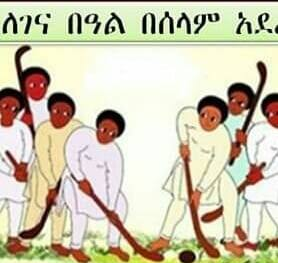Unique Features of Ethiopian Christmas ‘Genna’ - ENA English
Unique Features of Ethiopian Christmas ‘Genna’

By Fenet Hailu, ENA
Ethiopia, as one of the countries bestowed with abundant natural and historical tourist attraction resources, has inscribed various intangible heritages under UNESCO and still has plenty to offer to the world.
One among the peculiar Ethiopian festivals is ‘Genna’ – the Ethiopian Christmas - with quite varied ways of celebration from its date to cultural and religious rituals.
As the country follows its own calendar, Ethiopians celebrate ‘Genna’ - the birth of Jesus Christ - on the 7th of January, almost two weeks after the rest of the world mark the day.
Members of the Ethiopian Orthodox Church passes through special 43 fasting days called ‘Tseome Nebiyat’ the fast of the prophets, before the actual day of the Christmas. During the fasting days followers abstain from meat and dairy, making them totally vegetarian.
In the eve of Gena, the faithful, dressing white traditional cloths, gathered at churches for the mass church services that start after midnight and lasts in the morning of Christmas day.
The ceremony of the mass service is similar in every Orthodox Church except at the rock hewn churches of Lalibela, where the celebration is unique.
Genna in Lalibela
Lalibela is one of the oldest towns in Ethiopia located in the Northern part of the country and was seat of the Zagwe dynasty that ruled Ethiopia in the 12th and 13th century.
According to scripts of the Ethiopian Orthodox Church, Lalibela is considered as the second holy city of Christianity following Jerusalem, due to its 11 monolithic rok hewn churches.
King Lalibela, whom the town has renamed after him, has carved 11 monolithic churches hoping to create the ‘new Jerusalem in Ethiopia”.
The rock hewn churches of Lalibela, which carved out of rock in the 12th century, are inscribed by UNESCO as world heritages.
Lalibela is a high place of Ethiopian Christianity; still it is a place of pilgrimage, particularly during Christmas. Followers of the Ethiopian Orthodox Tewahido Church flow to Lalibela for Christmas to observe the unique celebrations.
The mass held in Lalibela for Christmas is unique. Dozens of priest, dressed with white traditional clothes and turbans, and long crosses with their hands, form a circle at the top and bottom of the monolithic churches. They sing a spiritual song called “Baza Kulu Lealem, Yom Tewelede” in Geaz language, which means “the savoir of the world has born today” using “Kebero”, which is similar to drum.
Abune Aregawi, Head of External Relations of Church, said Lalibela said the priests; standing at the top of the curve represents angels, who rejoiced the birth of Jesus Christ, while the ones at the bottom represent the people in this world.
The celebration in Lalibela is unique because of the King himself was born at the same day with Jesus as well as he devoted himself for the lord, Abune Aregawi
“… King Lalibela was born on the same day with Jesus Christ; he carved fascinating Churches, and Lalibela represents his spiritual devotion”, he said.
The spirituality, originality, and historicity of the overall ceremony in Lalibela fill one’s heart with a joy of wonder, admire and respect, not only the followers of the church but also visitors. That is why; thousands of tourists dare to join the faithful in the Chrismas celebration.
In this year’s celebration, over 200,000 guests are expected to take part on this year celebration, according to Head of Culture and Truism Bureau of Lalibela town, Setew Hailu.
‘Ye Genna Chewata’
Ye Genna Chewata is an Ethiopian traditional game which is similar to field Hockey, played during Christmas season. Even though, the tradition is fading around urban areas people in rural areas are still playing the game during Christmas, Solomon Afsaw, President of Ethiopian Traditional Sports Federation said.
Players use sticks made out of wood called ‘Gena’ to hit a round, hard wooden ball known as ‘Rur’ to play the game. Players wore special traditional clothes and shoes to illustrate their respect for the culture, fans and competitor, Solomon noted.
Before starting the game, the two competing teams assign their leaders and two old men from the crowd will be appointed as referees for the game. The game mostly started in the afternoon could last until the sun sets.
According to legend, the game is started from the joy of shepherds when they heard the birth of Jesus Christ that made them to jump and throw everything that they found around them by their wooden sticks.
The game is unique as political, administrative or other kinds of status are worthless - a master could play with his followers without restriction.
“Ye Gena Chewata is an indicator of freedom, equality, democracy, friendship and happiness in Ethiopia in those days, when the world was not exhibiting, and practicing democracy officially as today”, Abune Aregawi said.
Cheers with Genna
Likewise other holidays, Genna has served as an event for a get together for families and neighbors.
The day-long celebration is blessed with white traditional clothes called ‘yebahil libs’ made of cotton, traditional dishes and homemade alcoholic and nonalcoholic drinks along with the well known coffee ceremony makes the day attractive.
The day long celebrations that nurture coexistence and love are among the unique cultures of Ethiopians that lasted for centuries.